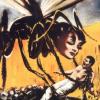In addition, SJW also resulted in differential modulation of the binding properties of 5-HT(1A)-, 5-HT(2A)- and mu-opioid receptors in a region-specific manner. The ability of SJW to affect 5-HT, dopamine and opioid systems in mesolimbic regions in the CNS, either by a direct or by indirect (adaptation) mechanism, may help to explain the efficacy of SJW in the treatment of depression clinically and in some of the behavioural effects observed in experimental rodents.

The Anticipatory Anhedonia Thread
#361
Posted 13 October 2013 - 11:51 AM
#362
Posted 10 November 2013 - 09:08 PM
The "extracts" or rhiodiolia in a pill is usually terrible, not dosed high enough, or extracted in unnecessary ways. Feels like a MAOI favoring dopamine, with a serotogenic background. It is good for the winter .
I'm not sure I buy it boosting endorphins.
#363
Posted 11 November 2013 - 11:36 AM
#364
Posted 06 March 2014 - 06:21 PM
- Shift from task to task without finishing anything.
- Become easily distracted.
- Miss important details.
- Make careless mistakes in homework and tests.
- Get bored quickly.
- Have trouble getting organized. For example, losing homework assignments or keeping the bedroom messy and cluttered.
- Don't seem to listen when spoken to.
- Daydream.
- Are slow to understand information.
- Have trouble following instructions.
Edited by Strangelove, 06 March 2014 - 06:23 PM.
#365
Posted 12 March 2014 - 10:39 AM
There is any correlation, of the ADD - PI symptoms and anticipatory anhedonia? Except from the slow to understand information, I think I have everything else...
- Shift from task to task without finishing anything.
- Become easily distracted.
- Miss important details.
- Make careless mistakes in homework and tests.
- Get bored quickly.
- Have trouble getting organized. For example, losing homework assignments or keeping the bedroom messy and cluttered.
- Don't seem to listen when spoken to.
- Daydream.
- Are slow to understand information.
- Have trouble following instructions.
for what its worth, the simptoms you listed correspond to mine (+hypersomnia and avolition, amotivation). i have tried stimulants and they did not work (ritalin, provigil)
I think serotonin plays a role, too
#366
Posted 12 March 2014 - 03:06 PM
#367
Posted 27 July 2014 - 04:09 PM
Bumping this, hopefully more people with experience/insight into this issue will contribute!
#368
Posted 28 July 2014 - 10:35 AM
Has anyone tried zembrin or yohimbine?
Has anyone tried zembrin or yohimbine?
#369
Posted 28 July 2014 - 10:53 AM
Has anyone tried zembrin or yohimbine?
Has anyone tried zembrin or yohimbine?
I tried yohimbine over a year ago when my anhedonia was bad, it only made me anxious and unpleasantly stimulated. Zembrin does seem like it could have some potential.
#370
Posted 28 July 2014 - 12:27 PM
Anyway guys, join my anhedonia forum ![]()
#371
Posted 29 July 2014 - 01:35 AM
Thank you so much for this thread, it has been, and continues to be, a wealth of great information and insight.
Much appreciated, friends. ![]()
I have been on low dose Naltrexone for around 2.5 months now, I have found it to work wonders for my physical exhaustion and issues. I have so much more energy, no more aches and pains, and I just feel so much more resilient. Placebo or not, I am feeling the best Ive felt in years, physically speaking. I was hoping it would touch on some of my mental issues like depersonalization and such, but I havent noticed any changes in that effect. Anyways, best of luck to everyone dealing with their struggles, Keep on learning and fighting!
Mike
#372
Posted 29 July 2014 - 02:32 PM
I don't know if this one has been mentioned before -
but I've had great results with Tianeptine recently. Not to be taken daily because of tolerance, but many people who didn't have success with most regular approaches seem to benefit from it, including people with treatment resistant depression. Allmost no side effects for most, either.
Its unique SSRE attributes are the factor that may make it interesting for people who've allready tried a lot of other approaches without success.
Edited by chris106, 29 July 2014 - 02:34 PM.
#373
Posted 29 July 2014 - 11:38 PM
Tianeptine's SSRE effects are only prominent at higher doses. It's mainly effecting glutamate at the standard doses.
What kind of benefits are you getting? Is music enjoyable, are you excited to play a game or watch a tv show/movie, is food more enjoyable, are you able to laugh more?
#374
Posted 30 July 2014 - 04:40 AM
Tianeptine's SSRE effects are only prominent at higher doses. It's mainly effecting glutamate at the standard doses.
I've never heard this before, can you link to any info that elaborates on this? I was under the impression that at the standard dosage (~12.5mg TID) the SSRE mechanism is what's responsible for producing the desirable effects.
#375
Posted 30 July 2014 - 05:23 AM
Here's an article on it:
#376
Posted 30 July 2014 - 08:44 PM
What kind of benefits are you getting? Is music enjoyable, are you excited to play a game or watch a tv show/movie, is food more enjoyable, are you able to laugh more?
Interestingly enough consuming media like music or movies/tv shows is not really more enjyable - I actually am more likely to feel that I waste my time when for example checking youtube videos for long periods of time - I conscider this a positive, since it also doesn't take enjoyment of that away, when you actually want to enjoy it.
Mostly it's anxiolytic - it's a noticeable stress relief, I imagine it would be hard to get really stressed out or annoyed by anything while on it. At the same time I don't feel dumbed down or too care-free ( For exampleit's not like being on phenibut, where you think everything is great as it is, even though it's actually not.) Also people have told me that I seem in a better mood and more positive - smiling at people and keeping eye contact is way easier.
So socialising is definetly more enjoyable, as well as the beauty in small things - like nature or a nice sunset.
When combined with caffeine and Theanine it offers a slight dopaminergic boost, it allmost reminds me a bit of the positive feeling I had when i started Ritalin years ago. But not as pronounced and without the side-effects and the dirty, pushy feeling to it.
All in all it's a very clean, mood boosting kind of effect, that allows to enjoy certain things more. After 4 days on consecutive use that effect diminishes noticeably - but after 3 days of cesation It seems to work for another 4 days again - so cycling would be prudent.
Edited by chris106, 30 July 2014 - 08:49 PM.
#377
Posted 16 February 2015 - 03:46 PM
I have noticed that the day after (18h+ after) taking modafinil (200-400mg) I have no aa at all. I haven't noticed this with sleep deprivation or lower dosage (ofc there might be an effect of that too but not as marked - since I can't remember it).
Edited by iwant, 16 February 2015 - 03:49 PM.
#378
Posted 17 February 2015 - 09:40 AM
Interesting, I remember reading that acute, but not chronic Modafinil enhances neurogenesis in the hippocampus. Perhaps this is one of the mechanisms that treats your anhedonia? This was the study: http://www.ncbi.nlm....pubmed/25158676
#379
Posted 16 April 2015 - 12:06 AM
Anhedonia is generally related to both cortical abnormalties and deficits in amygdala and hypothalamic function. You generally want to re-balance or lower cortisol / ACTH levels in order to restore quality of life, and you want to regenerate the dopaminergic system ; which may include augmenting histaminergic/serotonergic functioning.
Serotonin diminishes emotional capacity in high amounts, even moderate amounts , most receptors contradict dopamine signaling by direct or indirect mechanisms...depending on the receptor in question.
Serotonin only decreases anhedonia if it activates 5-HT6 or 5-HT4...in some cases, 5-HT1A activation may be helpful, in other cases it amplifies anhedonia. Pain relieving medications (narcotics, opiates) and serotonergic anti-depressants should be used with extreme caution but should really be avoided altogether.
#380
Posted 16 April 2015 - 12:40 AM
Anhedonia is generally related to both cortical abnormalties and deficits in amygdala and hypothalamic function. You generally want to re-balance or lower cortisol / ACTH levels in order to restore quality of life, and you want to regenerate the dopaminergic system ; which may include augmenting histaminergic/serotonergic functioning.
Serotonin diminishes emotional capacity in high amounts, even moderate amounts , most receptors contradict dopamine signaling by direct or indirect mechanisms...depending on the receptor in question.
Serotonin only decreases anhedonia if it activates 5-HT6 or 5-HT4...in some cases, 5-HT1A activation may be helpful, in other cases it amplifies anhedonia. Pain relieving medications (narcotics, opiates) and serotonergic anti-depressants should be used with extreme caution but should really be avoided altogether.
Actually the 5-HT2A is greatly implicated in pleasure and Galaxyshock has responded very well to Ginseng and SJW. Ginseng seems to agonize the 5-HT2A receptor, as 5-HT2A antagonists diminish the antidepressant effect, while SJW upregulates the receptor, and also the 5-HT1A receptor among other receptors.
What do the 5-HT6 and 5-HT4 receptors do? I haven't heard of them being useful for anhedonia before. Also, how would you target those specific receptors?
That's the first time I've heard of the amygdala and hypothalamus being implicated in anhedonia. Can you post the studies please? Also, how can you lower cortisol / ACTH levels and regenerate the dopaminergic system? The latter seems impossible with today's medicine. There is one substance that has shown promise in rats but no human studies have been done on it as of yet; It's called 9-me-BC. Jiaogulan can help restore homeostasis and is neuroprotective to dopaminergic neurons according to one study done in rats, but it wasn't clear if it had any regenerative properties or not.
#381
Posted 16 April 2015 - 02:14 AM
What do the 5-HT6 and 5-HT4 receptors do? I haven't heard of them being useful for anhedonia before. Also, how would you target those specific receptors?
5-HT(6) receptors enhance GABA-ergic signaling as opposed to many other serotonin receptors that inhibit it, it's also the main serotonin receptor involved in alleviation of anxiety and OCD (!) - therefore activation of results in a "clean" anxiolytic effect....(!)
I don't believe any direct and specific agonists exist for 5-HT6 (other than R&D), but I'll keep looking.
5-HT(4) activation enhances dopamine in some area's of the brain (as well as histamine and acetylcholine (!)) but can also result in negative gastro-intestinal sides such as diarrhea/IBS etc...the only downside to activating this receptor is it could exacerbate anxiety issues so it is sort of opposite to the 5-HT6R's in some ways.
Prucalopride, which is a 5-HT(4) agonist; therefore stimulating prefrontal dopamine, plus hippocampal/prefrontal histamine and acetylcholine - can be bought at TeamTLR's shop here.
Antagonists, which would help diarrhea and anxiety on the other hand, would be L-Lysine (!) and Chamomile(!).
Therapeutic Applications of 5-HT4Receptor Agonists and Antagonists(http://link.springer...-662-05553-3_10)
Metoclopramide is used to stimulate ‘upper gut’ motility and prevent nausea and vomiting. These clinical benefits are attributed, respectively, to 5-HT4 receptor activation23 and to antagonism at dopamine D2 and/or 5-HT3 receptors.52 However, since antagonism at dopamine D2 receptors within the striatum may also cause extrapyramidal reactions and akathisia, alternative 5-HT4 receptor agonists have been developed, with lower affinity for the D2 receptor. The most notable is cisapride. Metoclopramide and cisapride are marketed for gastrointestinal hypomotility disorders such as gastro-esophageal reflux (heartburn; mild esophagitis), functional or nonulcer dyspepsia and gastroparesis (e.g., caused by diabetic neuropathy).7 For both drugs, the most common side-effect attributed to 5-HT4 receptor activation is the promotion of loose stools and in more severe cases, diarrhea and abdominal pain.
That's the first time I've heard of the amygdala and hypothalamus being implicated in anhedonia. Can you post the studies please?
I suggest you read this book, it's free, just go to link, already there.
::.... Neurobiological mechanisms of anhedonia :...:.::
The orbitofrontal cortex is a nexus for sensory integration, the modulation of autonomic reactions, and anticipation in learning, prediction and decision-making for emotional and reward-related behaviours.[/size]50[/size]Ncuroimaging studies have found that the reward value,[/size]51[/size] and the expected reward value,[/size]52[/size] and even the subjective pleasantness of food[/size]53[/size] and other reinforcers are represented in the orbitofrontal cortex. The orbitofrontal cortex receives input from the five classic sensor}' modalities: gustatory, olfactory, somatosensory, auditory, and visual,[/size]54[/size] and also receives visceral sensory information. This large variety of inputs makes the orbitofrontal cortex one of the most polymodal regions in the entire cortical mantle.[/size]53[/size] The orbitofrontal cortex has direct reciprocal connections with other brain structures, including the amygdala, cingulate cortex, insula/operculum, hypothalamus, hippocampus, striatum, periaqueductal grey, and dorsolateral prefrontal cortex. Hence, the orbitofrontal cortex may have an important role for representing incentive salience, hedonic impact, and subjective hedonic experience, ic, constituting the link between reward and hedonic experience.[/size]53[/size]
It has been shown that the human amygdala is a key structure for extracting the affective significance from external stimuli,55 responds preferentially to emotionally valenced faces, for fearful but also for happy faces, and rapidly habituates to them.56 According to discrepant findings,57,58 the amygdala could be considered as reacting more intensively for negative stimuli, explaining its major function in fear and anxiety.
Also, how can you lower cortisol / ACTH levels and regenerate the dopaminergic system?
Lowering cortisol and ACTH would be by using adaptogenic herbs such as rhodiola rosea, ashwagandha, and gotu kola...alternatively, you can use a 'strong' direct cortisol blocker such as PES Erase or SNS Reduce XT.
You also need to raise your stress threshold and decrease overall exposure to stressful situations....leaning out and hitting the gym regularly will help as well.
As far as dopamine, yes, 9-me-BC what I was referring to. You can also do a specific carboline intake method, take 9-me-bc 7 days on, then take 2 days off and use maca powder which contains beta-carboline alkaloids - the point is using complex substances that regenerate the hypothalamus and then to move back to central functioning I.E the dopamine networks .
Edited by Area-1255, 16 April 2015 - 02:37 AM.
#382
Posted 16 April 2015 - 07:36 PM
Galaxyshock - you brought up several herbs for this condition: Jiaogulan, Gotu Kola, SJW.
Are they still working for you? Do have some new suggestions? Thank you.
I just started Jiaogulan and I think get the same great initial benefit you describe earlier in this thread.
#383
Posted 16 April 2015 - 10:47 PM
Galaxyshock - I am also wondering what PAWS you suffer from (ie. Benzo or ...?). I have Benzo PAWS. Currently trying SJW and NAC with NSI-189 on the way. What has helped you the most? how much SJW do you take?
#384
Posted 20 June 2016 - 06:27 PM
Hi fellows,
I am noticing this thread seems pretty dead. Was wondering however what you think about memantine/ketamine. These studies show great potential.
Memantine treatment reverses anhedonia, normalizes corticosterone levels and increases BDNF levels in the prefrontal cortex induced by chronic mild stress in rats
Anti-anhedonic effect of ketamine and its neural correlates in treatment-resistant bipolar depression (Nature, 2014)
Foremost among these findings is that ketamine, compared with placebo, rapidly reduced the levels of anhedonia in these patients; this reduction occurred within 40 min of a single ketamine infusion and lasted up to 14 days. These results are particularly important from a public health perspective. No approved treatments for anhedonia currently exist despite its prevalence across multiple psychiatric disorders. Thus, ketamine’s rapid effects (within 1 h) on anhedonia levels are a crucial clinical finding.
Also tagged with one or more of these keywords: anhedonia, motivation, depression, adhd
8 user(s) are reading this topic
0 members, 8 guests, 0 anonymous users























































